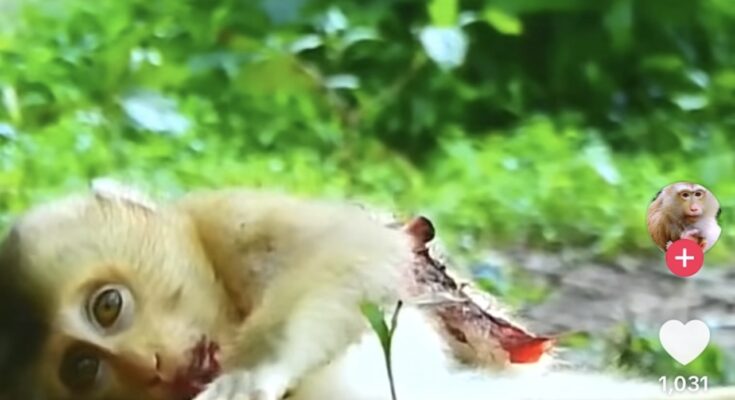In the heart of a once-safe forest, a baby monkey’s innocence met with cruelty when it was caught in a hidden poacher’s trap—an act that left its tiny leg broken and its future uncertain. This tragic incident is more than just a single animal’s suffering; it is a glaring reminder of the unchecked dangers wildlife face daily, even in protected areas.
The young monkey, estimated to be only a few months old, was part of a small troop living near the forest edge where human encroachment has steadily increased. While climbing through low-hanging branches near the ground, it stepped into a steel snare typically set for bushmeat. The trap snapped shut violently, shattering its fragile leg and pinning it to the forest floor. Its mother reportedly stayed close, shrieking and pulling at the trap, unable to free her baby, until rescuers arrived.
Wildlife rescue workers, alerted by local villagers who heard the cries, reached the scene hours later. By then, the baby was in shock, its leg badly swollen and bloodied. With great care, the team sedated the injured animal and transported it to a wildlife rehabilitation center. The prognosis is guarded—though the leg may heal, there’s a high risk of infection or long-term disability.
Sadly, this baby monkey’s story is not unique.
Poaching and illegal trapping remain a serious threat to wildlife across many parts of the world. Though often driven by poverty, ignorance, or commercial gain, the use of indiscriminate traps is especially cruel. These snares do not discriminate—they capture whatever animal happens to wander into their path, often leaving them to suffer for days or die from infection, starvation, or predation.
Primates, especially young ones, are particularly vulnerable. Their curious nature, small size, and tendency to stay low in the forest canopy make them easy targets. Beyond the physical harm, these incidents cause deep psychological trauma, as primates are highly intelligent and social animals that form strong familial bonds.
What makes this story even more tragic is that such suffering is preventable. Conservation groups and local authorities have long called for stronger anti-poaching laws and community education. But enforcement remains weak in many regions, and traps continue to be set, often unchecked.
There is hope, however.
Thanks to swift action by the wildlife team, this baby monkey now has a chance to recover. The rehabilitation center, funded by donations and staffed by volunteers, provides medical treatment and long-term care to injured animals. If the monkey regains mobility and strength, it could eventually be reintroduced to the wild—ideally, back to its troop if they can be found.
The story of this baby monkey should ignite action, not just sympathy. Poaching and illegal trapping are not just threats to individual animals; they are a direct assault on biodiversity. Every life matters. And every effort to stop cruelty counts.
If you wish to help, support local wildlife conservation groups, report illegal traps if you see them, and share stories like this to raise awareness. The more we speak for those who cannot, the louder the message becomes.



